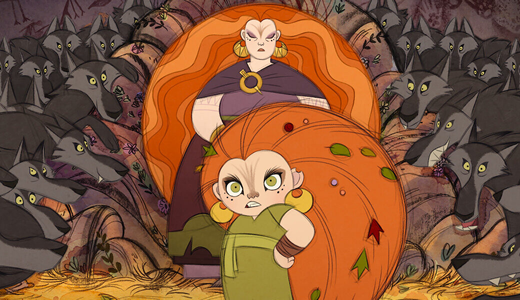We’re in the middle of what’s often called awards season, when folks in the movie industry (as well as TV and music) hand each other trophies. It’s also a natural time to look back and think about the entertainment year that was—and think about what might be up for some awards-season hardware in the coming weeks and months.
And for me, it’s an opportunity to think about how faith and film intersected in 2020.
It’s not unusual to see religion and spirituality make their mark on Oscar-bait movies (for good or ill), and this year was no exception. We might talk about those movies a bit more broadly sometime later in the blog, but today I want to focus on something that surprised me: How much spirituality I found in the year’s most prominent animated films.
Most animated movies are aimed at A) children, and B) really wide audiences. The best of them seem designed to make kids laugh and their parents cry, and they almost define what it means to be a four-quadrant movie—something that can please almost everyone. Under the theory that religion is inherently controversial, animated moviemakers generally shy away from it. You’ll rarely see any sort of meaningful faith or religious content in most animated films.
But this year was different. In fact, 2020’s likely crop of animated Oscar nominees talk a lot about spirituality.
Take Onward, Pixar’s first animated flick this year (and the last movie to get a meaningful theatrical run before theaters shut down). It’s really an upside-down adventure story that takes place in a not-so-fantastical fantasy world. It’s arguably the least spiritual movie I’ll be talking about here, but it still deals not just with magic (which is, of course, a pretty common feature in animated flicks), but with the hereafter.
In the movie, two elven brothers magically yank back their dearly departed father (or, at least, half of their father) from whatever state he was in. While Onward doesn’t mull a lot of theological mysteries here, it is predicated on a huge spiritual question: What happens when we die? Clearly, in Onward’s telling, this deceased father’s soul lived on in some manner.
Netflix’s Over the Moon, meanwhile, is in some ways both more and less spiritual than Onward. It’s not predicated on bringing back the dead, but rather, blasting to the moon to visit a Chinese goddess. The film is really about family, and change, and how difficult it can be when a family changes around you. But the story’s mythological notes are critical as well. And while that goddess (Chang’e is her name) feels a bit more like a Paul Bunyan tall-tale character than a religious figure, certainly her importance to the story (and to Chinese mythology) can’t be ignored.
Those two movies invite, but don’t require, any serious spiritual unpacking. Parents talking with their kids could deal with the movie’s metaphysical and religious themes relatively quickly. But Wolfwalkers and Soul–considered the prime contenders for this year’s Oscar for animated feature—require more thought. Both are incredibly, and inescapably, spiritual.
Wolfwalkers, while its animation is lovely and its story pretty fun, comes with some inescapable problems for Christian parents. The movie’s heroes (best friends Mebh and Robyn) can turn into wolves—kind of a big hairy deal in the late Medieval period the film is set in. The main antagonist is a guy called the Lord Protector, and he’s a devout, angry Christian. It sets up a curious pagan/Christian divide that, at the very least, parents will want to address.
Soulis more complex. It’s about a guy named Joe who dies and heads off to a nondenominational afterlife, where he meets up with a disembodied soul that’s waiting to head down to earth to inhabit a body. She’s reluctant to go, though, while Joe feels like his life was cut off far too quickly. This Pixar movie is really far more about this life than the afterlife or beforelife, but the movie’s spiritual elements are absolutely critical to the narrative here—and not all of them adhere to an orthodox Christian understanding of either. If a couple of philosophically minded adults could spend an hour talking over the spirituality of Onward, Soul might take a week. And certainly, children might come away with lots of religious questions after watching it.
This year’s crop of awards-worthy animated films should remind us all how important it is to be engaged with our entertainment—even animated movies “made” for children. You shouldn’t just plop your son or daughter in front of a screen of even a G or PG movie and assume that it’ll be just fine for them to watch.
Content worth thinking about and screening isn’t just constrained to sex scenes and bad words. All of these films have some tremendous aesthetic upside, and all have really nice messages in them, too. But each offers other messages that are worth a bit of pause, a bit of thought and—if you decide to let your kids watch—intentional conversation, too. Because even great animated movies can sometimes make pretty bad babysitters.







Recent Comments